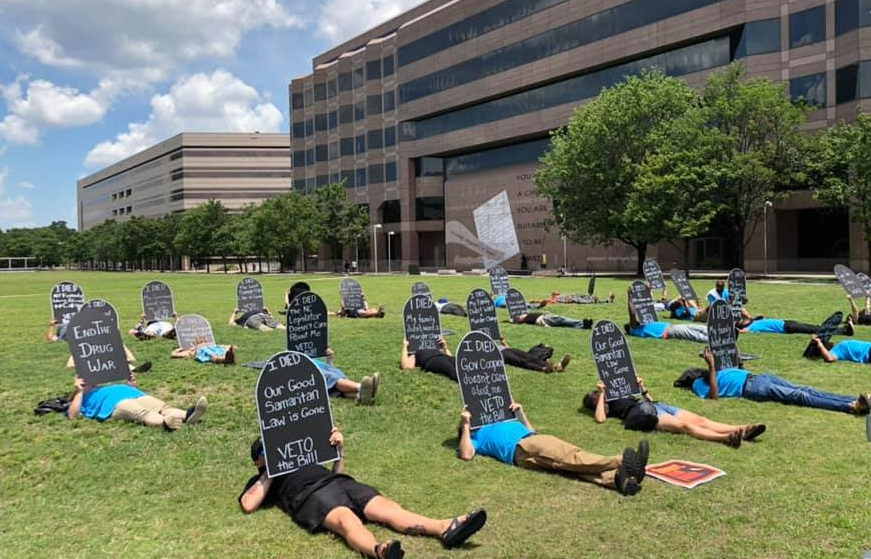On July 8, North Carolina Governor Roy Cooper signed into law a bill creating a new criminal offense category that carries harsher punishments for people allegedly distributing drugs involved in an overdose death.
Before the bill was approved by Governor Cooper, defendants charged for the same behavior faced a maximum of three years in prison for involuntary manslaughter, one of the lowest classes of felonies. Now, when convicted of the new “death by distribution” offense, defendants could be sentenced, at most, to more than 40 years in prison.
The bill’s Republican sponsors hope that the new offense will be “a greater deterrent to persons who want to illegally distribute opioids and further exacerbate the opioid epidemic,” as the text reads. Evidence evaluated in a 2018 Pew Charitable Trust report suggests the contrary. It “found no statistically significant relationship between state drug imprisonment rates and three indicators of state drug problems: self-reported drug use, drug overdose deaths, and drug arrests.”
HB 474 and SB 375, as the bill is called, requires that the defendant “did not act with malice” when distributing the drug. If “malice” is determined to be behind the offense, the defendant could face second-degree murder charges.
The bill follows the “usual War-on-Drugs approach: to satisfy the urge to take the punitive approach,” said Jeremiah Goulka, a senior fellow at the Health In Justice Action Lab at Northeastern University’s law school. Before the success of the “death by distribution” law, prosecutors, Goulka explained, were relying on plea bargaining to convict involuntary manslaughter cases, a trend seen nationwide in 97 percent of criminal cases. The new law will relieve prosecutors from proving a defendant’s awareness of the risks of drug use, or mens rea. Instead, defendants will be liable for distributing controlled substances regardless of their understanding of the potential health threats posed by them.
According to an estimate by the Conference of District Attorneys, four of the 71 defendants convicted of involuntary manslaughter in 2018 met the requirements for the new offense.
“This bill doesn’t criminalize the addiction,” said Representative Dean Arp at the June 27 House vote that placed it on the governor’s desk. As described in the bill, filed by Rep. Arp himself, the legislation aims to intervene in how the overdose crisis is “overwhelming medical providers engaged in the lawful distribution of controlled substances and is straining prevention and treatment efforts.” Instead of committing more resources towards treatment and harm reduction services in a state that saw 1,884 unintentional opioid-related deaths in 2017, the bill “encourage[s] effective intervention by the criminal justice system to hold illegal drug dealers accountable for criminal conduct that results in death.”
“Kingpins,” or traffickers centrally positioned in the supply chain, are likely to not be prosecuted under this new offense category, believes Goulka. Because of the requirement to demonstrate a causal relationship between the supplied drugs and the person’s death, people who directly delivered them are likely to be criminalized. “They tend to be fellow users, friends or family,” said Goulka. A Health In Justice study of online news reports between 2000 and 2017 found that half of the 213 defendants accused of drug-induced homicide were either a caretaker, family member, friend or partner. Fewer than half (47 percent) held a “traditional dealer/buyer” relationship with the deceased.
From a policy perspective, Representative Marcia Morey described this as counterproductive during the June 27 House debate. “We don’t want to be prosecuting family members and friends when a minor sale could be involved in sharing drugs, and someone is in dire need of emergency services.”
Rep. Morey fears that the bill could actually prevent people who are overdosing from getting the care that they need. “This [bill] can deter Good Samaritans from calling 911 in case of an overdose to get medical help for someone who might be dying from an overdose,” she said following Rep. Arp’s June 27 statement. A “death by distribution” offense, according to the bill, would not “restrict or interfere with the rights and immunities” ensured to people seeking help for someone experiencing an overdose. Even so, Rep. Morey believes that “It’s an unintended consequence but it’s a real consequence.”
Similar laws in other states have failed to turn the tide in the opioid-involved overdose crisis, observes Rep. Morey. Under Pennsylvania’s “Drug Delivery Resulting in Death” statute, district attorneys across the state brought 186 cases in 2017, the same year that overdose deaths hit record highs. (Since then, data projects that deaths in 2018 likely decreased.) According to a dataset created by Health in Justice Action Lab and Legal Science, 25 states have drug-induced homicide laws on the books, some of which have been hit the hardest by the opioid-involved overdose crisis, like West Virginia and New Hampshire.
“It does not reduce opioid deaths. It has prevented emergency services to come in and help save people,” claimed Rep. Morey. “I wish we could work on this more; get better drug treatment, better drug courts—that’s the way to reduce these deaths. This bill is not the way.”
Photograph of a North Carolina Survivors Union protest of the bill, via Louise Vincent
Correction, July 10: An earlier version of this article misnamed North Carolina Governor Roy Cooper.




